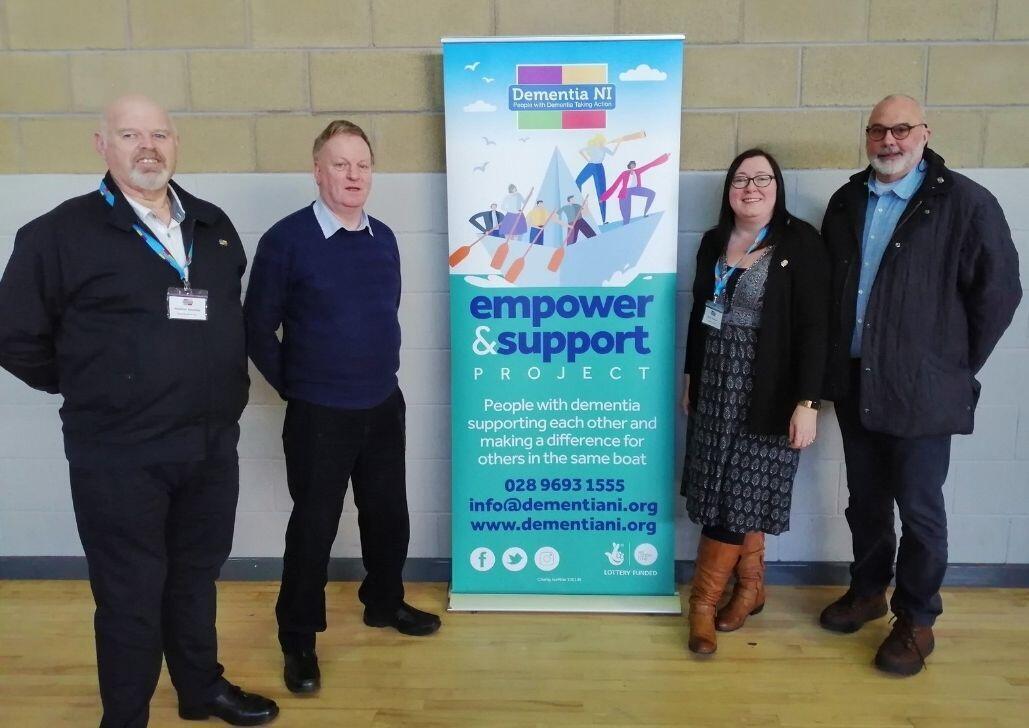A Day In The Life Of A Dementia NI Empowerment Lead: Hazel Haworth

Hazel Haworth, our Empowerment Lead for South & West NI, takes us behind the scenes at Dementia NI so we can learn more about the difference our Empowerment Team make to local people with dementia, helping them to stay independent and have their voices heard in the community.
When did you start working with Dementia NI?
I joined Dementia NI in October 2019. Previously, I'd been working five days a week at the Alzheimer’s Society and studying for a master’s degree in Dementia two days a week, which left no time for family. Everything about the organisation and role mirrored what I'd been writing about for my masters. After experiencing some poor examples of dementia care within care homes I’d worked in, and witnessing my own grandmother’s journey with dementia, I was determined to find a job where I could make a difference to individuals with dementia and within society.
Can you describe your main responsibilities?
Supporting our members and those newly diagnosed to take part in empowering opportunities and to remain involved in things that are important to them. This is different for each individual. Some members need encouragement and a listening ear, while others want support to take part in media opportunities or activism. It is my responsibility to ensure that each member has opportunities that meet their personal requirements and that they can access them in a way that suits them.
What is a typical week like for you?
The job of an Empowerment Lead is varied. We're always juggling different projects and meetings. We must be organised and efficient. On a weekly basis I find myself doing the following: facilitating Empowerment Groups (setting agendas, writing minutes and hosting sessions); meeting organisations that wish to work with our members; visiting new referrals (people recently diagnosed with dementia) to provide information and support after diagnosis; facilitating our In the Same Boat service where newly diagnosed members have the opportunity for a one-to-one peer support session with a current member and supporting or recruiting volunteers.
I also attend consultations hosted by other organisations, deliver awareness training to the public, take support calls from members or the public, attend review and support visits to current members. And lots, lots more!

What skills and experience do you bring to the role?
I've worked in health and social care for nearly thirty years, working with people at all stages of the dementia journey. While studying with the Open University I completed two interesting modules on dementia support and end-of-life care. At the same time my grandmother was diagnosed with Vascular Dementia, so this became a particular interest to me. I was so inspired by what I learned that I went on to complete a post-graduate MSc in Dementia Studies, which has given me experience in the field of dementia research. I like to hope I make members feel comfortable and valued, and that they find me approachable, supportive and knowledgeable.
Which projects have inspired you the most?
There have been so many! I am amazed at how much our organisation accomplishes and I’m continually inspired by the determination and passion of our members. I’m particularly proud of our involvement in the Herbert Protocol in Northern Ireland. Our members worked alongside the PSNI to develop this much-needed resource which supports the police to find people with dementia if they go missing. Also, working with our members to determine key questions to ask Health Minister Robin Swann [when we met with him in June 2020 to discuss the importance of including people with dementia in services] was rewarding and inspiring. The passion, enthusiasm and hard work of our members shone through and I was so proud of them.
What has been your most rewarding experience at Dementia NI?
One of the things I find most rewarding is seeing the growth in confidence, self-esteem, and feelings of self-worth that new members develop after joining the organisation. I visit people at the point of diagnosis, when often they feel hopeless and lost. But after meeting our other members and seeing them live such positive, valuable, and enjoyable lives, that hope begins to resurface – then before you know it, they are brimming with confidence, enjoying life, and cultivating a whole new circle of friends.
What does working to empower local people living with dementia mean to you?
It's really important to me that my work feels worthwhile and valuable. Knowing that your efforts have the potential to change someone’s world (or change the world for a whole community of people) is a real motivator!
What would you say to people thinking about applying for a role at Dementia NI?
Go for it! We are a real team. Our members work alongside us, and they support us as much as we support them. If you want a rewarding job role and are dedicated and professional, you will really enjoy it. We are a small team so it’s important that everyone pitches in and pulls their weight – this also means that you get more opportunities and experience to develop your skills than you would in a larger organisation.
What three words would you use to describe working here?
Rewarding, challenging, and worthwhile.